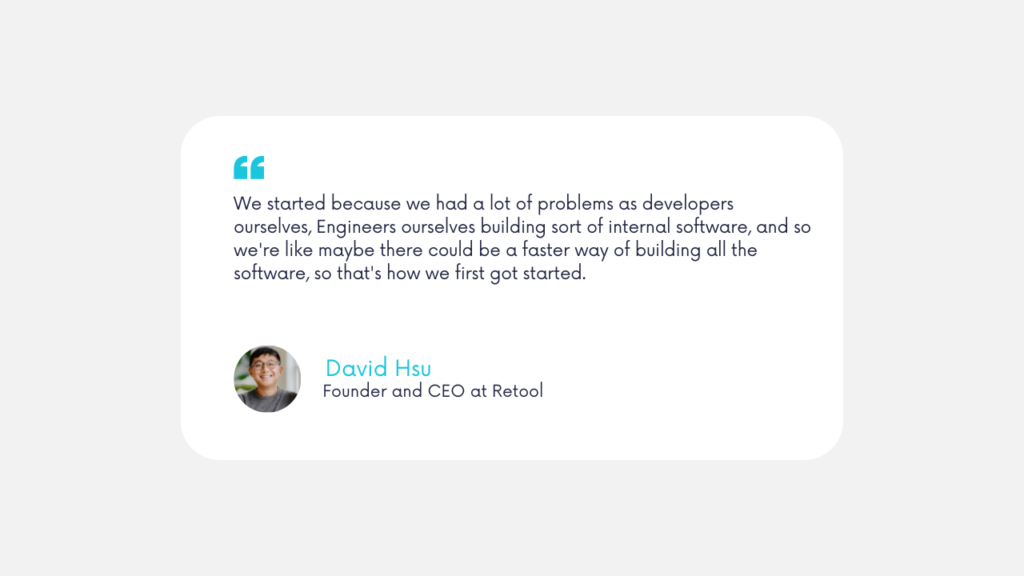Have you ever faced the challenge of finishing a project quickly but got slowed down by the time-consuming process of developing a bespoke application or workflow? In such a situation, you need a rapid and flexible development tool.
Now, imagine you could simply drag and drop components, seamlessly connect to databases and external systems, and quickly code where needed, all within a unified development environment. This is exactly what a talented founder and CEO like David Hsu has crafted.
Whether you’re a company aiming to accelerate its product roadmap or an enterprise focused on strengthening security and compliance measures, Retool offers the speed and efficiency to tackle diverse challenges in software development.
But was David Hsu’s journey to becoming a successful CEO smooth from the start? What are the crucial character features that helped David become CEO? What was his path to success overall?
Let’s delve into all of the insights in our article below!
Early years & founding of Cashew
David Hsu’s parents, originally from China, had immigrated to the United States for post-graduate studies. By the time, they welcomed their son David Hsu in Silicon Valley.
When David was 16, his parents decided to move from Palo Alto to Saratoga, aiming to provide a different environment for David, away from what they perceived as a distracting friend group, and to encourage better academic focus.
Yet David had a high interest in startups and technology that was fueled by his avid reading of Hacker News and witnessing the impact of technology during the rise of Twitter and the Arab Spring. His parents’ attempt to instill discipline inadvertently steered Hsu toward a philosophical and technological exploration path.
David Hsu started obtaining a Bachelor of Arts in Philosophy and Computer Science. In 2015, during his senior year at Oxford, David Hsu identified a gap in the U.K. market for a peer-to-peer payments system. It was a moment when he wanted to pay back his friend for buying an ice cream for him when he realized England simply doesn’t have such an easy option to send money.
This realization led to the conceptualization of Cashew, a startup that addresses the absence of an easy means for people in the U.K. to send money to each other, similar to the popular Venmo service in the United States. Hsu’s initial exposure to the challenges of outdated ticketing systems while organizing events at Oxford also contributed to the formation of Cashew.
By winter 2017, despite initial traction and gaining acceptance into Y Combinator, Cashew faced insurmountable challenges. The business model, which involved transactions incurring fees paid to credit card providers, proved unsustainable as the user base expanded. The costs associated with these fees became a significant burden, leading to a dwindling bank account. Efforts to pivot by convincing retailers to adopt a Cashew digital wallet also proved unsuccessful.
Eventually, the Cashew team, realizing the financial model’s shortcomings, decided to wind down the venture, marking a pivotal moment in Hsu’s entrepreneurial journey.
Birth of Retool
After the failure of Cashew, David Hsu, a future Retool founder, undertook a reflective approach to understand the lessons from the experience. Recognizing the inefficiencies in the internal systems developed for Cashew, Hsu saw an opportunity to repurpose the code for broader applications. This insight led to the inception of Retool, a software development platform offering customizable building blocks for developers.

David Hsu was fraught with uncertainty and fear when he decided to start a company. The early days were particularly challenging, and the pivotal moment came during an accelerator program called Y Combinator. This program, occurring twice a year, culminated in a crucial event known as demo day.
As David reflects, “We went through this accelerator called Y Combinator, and at the end of every batch, there’s a demo day, where everyone presents their ideas and the progress made over the past few months.” However, the initial idea they had worked on was deemed so unfavorable that they were hesitant to present it. The embarrassment and shame of not having a compelling project compared to their peers were palpable. Seeing others confidently raise funds and present their successes was a humbling experience, leaving David and his team questioning if they were on the right path.
This moment of uncertainty became a turning point, pushing them to reevaluate their direction and ultimately shape the trajectory of their entrepreneurial journey. Even though it was a challenging time, David Hsu got strength from a supportive network, particularly advisers at Y Combinator, securing $1.5 million. When their initial idea seemed flawed, Y Combinator partners reassured David, expressing belief in him rather than just the concept. This encouragement became a vital catalyst, propelling David forward with newfound determination. Thus, at the age of 25, David Hsu became the CEO and founder of Retool.
Retool nowadays
Now let’s talk in detail about Retool: Why is Retool so popular? Who invested in Retool? And is Retool profitable nowadays?
Retool company is a highly popular automation tool known for its no-code approach, allowing users to build automation without the need for coding skills. It stands out among low-code platforms for its user-friendly design, making learning easy. With Retool, users can use features like.
- UI and programming code extending;
- application templates;
- workflows;
- customized branding;
- data synchronization;
- data migration;
- and lifecycle management.
It caters to a diverse range of industries with readily available templates, making it a favorite for those seeking a powerful yet accessible solution for automation.

In 2017, Retool attracted investments from influential figures in the tech sector, including Patrick & John Collisons, founders of Stripe; Nat Friedman, an entrepreneur and developer passionate about customer-centric product development; Elad Gil, Co-Founder of Color Genomics and former Vice President at Twitter; and Daniel Gross, Co-Founder of Pioneer and former Head of AI at Y Combinator. Their support has contributed to Retool’s growth and its mission to revolutionize software development.
Retool secured funding in consecutive years, receiving investments in 2019, 2020, 2021, and 2022. In 2022, Retool has secured $45 million in a Series C2 funding round. Since its founding in 2017, Retool has facilitated the creation of over 500,000 apps with billions of queries, emphasizing a new, faster approach to software development.
Initially focused on internal apps, Retool plans to use funds to improve functionality, hire talent, and expand geographically.
Currently, Retool is valued at $3.2B and has recently expanded its capabilities by introducing new tools for users to build AI-based applications. The startup now offers Retool Vectors, a hosted vector storage service that allows users to add context to large language models (LLMs) more efficiently. The company’s recent launch includes AI-based actions for text summarization, classification, image generation, and more, developed in collaboration with OpenAI, along with the Workflow service to maintain synchronization between production and vectorized databases.
Valuable advice from David Hsu
David Hsu, Retool founder, emphasizes that the ideal timing for starting a company is during youth or even while in school. He highlights the abundance of free time and a lot of energy available during this period, making it conducive to pursuing new ideas.
Reflecting on his own journey, David attributes the inception of Retool to side projects undertaken during school, showcasing the advantages of starting young.
However, David Hsu is a realist who talks about the risks. Thus, David doesn’t support impulsively quitting a job without a well-formed idea. He stresses the importance of having at least a conceptualized idea, ideally proven to some extent, before taking such a leap. Recognizing the element of luck in his own success, David acknowledges the precarious nature of entrepreneurship, where outcomes may not always be guaranteed.







